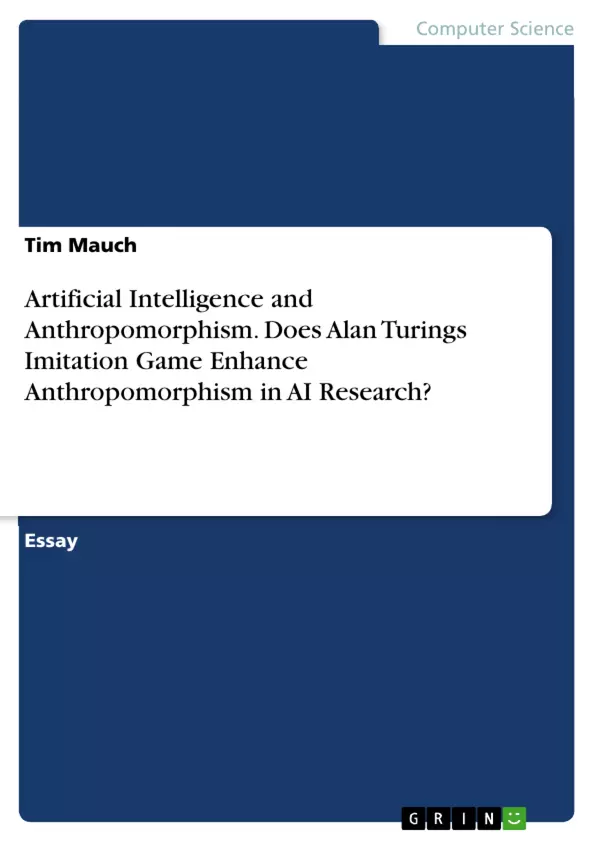In this essay the question will be discussed whether or not Alan Turing’s concept of the “imitation game” enhanced and enhances the tendency for anthropomorphism in the field of AI – and if so, to what extent.
Artificial intelligence (AI) is one of the newest scientific fields, starting in the middle of the 20th century with the goal of creating intelligent entities. Nonetheless the scientific roots of the field reach far behind since the history of humankind – of homo sapiens – has always been coined by the goal of understanding what intelligence is. Therefore, AI is a highly interdisciplinary field of science including engineering, philosophy, mathematics and logics, psychology and other natural sciences.
The high potential for controversies in such an interdisciplinary field of study becomes already obvious by the fact that there is no common definition of what intelligence is. Is intelligence something that goes beyond the natural materialistic world and is “human-exclusive”? Or can it be reached by technical reproduction of the human brain and its cognition?
Inhaltsverzeichnis (Table of Contents)
- Introduction
- Fundamental Aspects about AI today
- General
- Development of artificial intelligence
- Symbolic and Connectionist Paradigm
- Anthropomorphism in Artificial Intelligence
- A Brief Psychological Theory on Anthropomorphism
- The Use and Possible Reasons for Anthropomorphism in Artificial Intelligence
- Beyond Human Mind
- Interim Conclusion
- Turing and Anthropomorphism
- The "Imitation Game"
- Anthropomorphism Used by Turing
- Discussion of the Turing Test
- Pre-History of AI
- Conclusion
Zielsetzung und Themenschwerpunkte (Objectives and Key Themes)
This essay explores the question of whether Alan Turing's concept of the "Imitation Game" enhanced and enhances the tendency for anthropomorphism in the field of AI. The essay aims to provide a critical explanation of anthropomorphism in the context of AI development, focusing on its historical evolution and potential impact.
- The role of anthropomorphism in AI research
- The development of AI from a historical perspective
- The impact of Alan Turing's "Imitation Game" on anthropomorphism in AI
- The concept of strong and weak AI
- The connectionist and symbolic paradigms in AI
Zusammenfassung der Kapitel (Chapter Summaries)
The introduction lays out the central question of the essay: does Alan Turing's "Imitation Game" contribute to anthropomorphism in AI? It then provides context by outlining the history and development of AI, highlighting the lack of a universal definition of intelligence and the ongoing debate about whether AI can truly replicate human cognition.
Chapter 2 delves into fundamental aspects of AI today, exploring the distinction between human-centered and rational approaches to AI, and the limitations of current AI systems. The chapter also introduces the concepts of strong and weak AI, as well as the two dominant paradigms in AI research: connectionism and symbolism.
Chapter 3 focuses on the concept of anthropomorphism in AI, offering a brief psychological perspective on the phenomenon. The chapter explores the uses and reasons for anthropomorphism in AI research, examining how it can influence both the perception and development of AI systems.
Chapter 4 examines Turing's "Imitation Game" and its potential contribution to anthropomorphism in AI. The chapter analyzes the structure of the Turing Test, considering its implications for the development of AI and its influence on the field's trajectory.
Chapter 5 provides a historical overview of the pre-history of AI, offering insights into the intellectual context that shaped Turing's work and potentially contributed to the ongoing debate about anthropomorphism in AI.
Schlüsselwörter (Keywords)
Key concepts explored in this essay include artificial intelligence, anthropomorphism, the Imitation Game, strong AI, weak AI, symbolic AI, connectionism, cognitive processes, machine learning, and the history of AI.
- Arbeit zitieren
- Tim Mauch (Autor:in), 2020, Artificial Intelligence and Anthropomorphism. Does Alan Turings Imitation Game Enhance Anthropomorphism in AI Research?, München, GRIN Verlag, https://www.hausarbeiten.de/document/1006412


